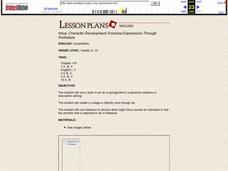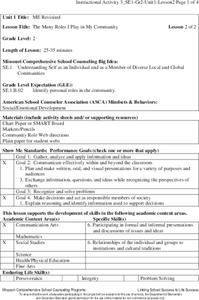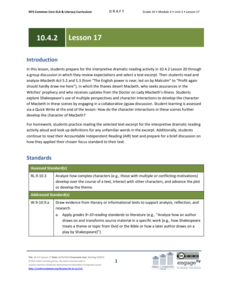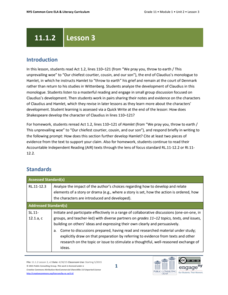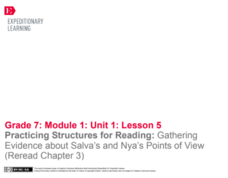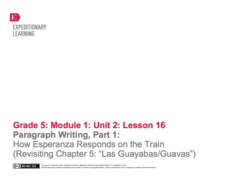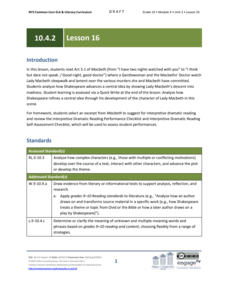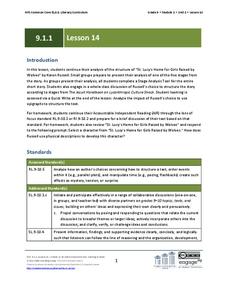Curated OER
CHARACTER DEVELOPMENT: EXAMINE EXPRESSIONS THROUGH PORTRAITURE
Students use a work or art as a springboard to a personal narrative or descriptive writing, create a collage to identify tone through art, and use inference to discern what might have caused an individual to feel the emotion that is...
Missouri Department of Elementary
Goldilocks Revisited
After a read-aloud of the story Goldielocks and the Three Bears, scholars gather into small groups to answer a series of questions. Peers examine the idea of smart decisions and identify three feelings of characters alongside three...
Missouri Department of Elementary
The Many Roles I Play in My Community
Small groups brainstorm their roles in the community. Then, individually, complete a community roles web worksheet. Peers share their completed product and extend the conversation to include the feelings and character traits that go...
Missouri Department of Elementary
An Apple a Day
Three apples—green, red, and rotten—exemplify character traits, negative and positive. Following a discussion about the classroom community, scholars complete an apple-themed worksheet that challenges them to read each trait, color it...
EngageNY
Key Incidents Reveal Aspects of Character: Survival at Sea (Pages 114-168)
Learn from experience. As part of their study of Unbroken, scholars use a turn-and-talk strategy to discuss Louie's experiences and the presence of God while he is lost at sea. They then read quotes from the text and infer what the words...
Benjamin Franklin Tercentenary
What Ben Read
Just what did Ben Franklin read? By juxtaposing Ben Franklin’s reading material as a young man with an analysis of his developed ideas, learners gain the opportunity to see how the influences of his youthful reading played out. Roman,...
Literacy Design Collaborative
Text Analysis and Character Revelations: Flowers for Algernon
What does your character reveal about you? Scholars carry out several activities to determine the reveal of character in Flowers for Algernon. Readers answer text dependent questions, complete diary entries, write reflections, and use...
Missouri Department of Elementary
What Color is Your Apple?
Build your classroom community with an activity that uses apples to examine oneself and their classmates. Participants draw four large apples on blank paper then exchange them within a small group. Group members write a character trait...
EngageNY
Analyzing Character: Launching Pygmalion, Part 2
Readers of Pygmalion use Eliza Character Tracker Parts one and two to notice and wonder about character analysis. They read text excerpts and mark details that show how Eliza feels and why she acts in certain ways. To finish, they answer...
Curriculum Corner
Fiction Graphic Organizers
Get an in-depth look into a narrative text with a three-page worksheet that examines a story's character—actions, sayings, thoughts, and appearance—setting, and challenges scholars to write a brief summary about what they've read.
EngageNY
Grade 10 ELA Module 4: Unit 2, Lesson 17
Madness, violence, despair—the titular character of Shakespeare's Macbeth is spiraling out of control. Pupils first explore the topic with a collaborative jigsaw discussion. At the end of the instructional activity, they write about how...
EngageNY
Close Reading and Summarizing: The Epilogue of Pygmalion
Moving from what to why. After completing questions over the epilogue of Pygmalion, scholars take a close look at their Eliza Character Trackers and complete part II. They have collected a lot of details about Eliza's character and now...
EngageNY
Planning Ideas: Developing a Colonial Character Profile
The second lesson in a historical fiction series encourages pupils to develop a character profile of a colonial person using research acquired in the previous unit. Learners prepare their historical fiction narrative by responding to a...
Curated OER
Mini-Lesson Planning for Inferences
Making inferences and drawing conclusions is a key component to successful active reading. Encourage your class to use context clues and prior knowledge to infer different elements of a story, including the setting, plot, and character...
Literacy Design Collaborative
The House on Mango Street
After reading Sandra Cisneros' The House on Mango Street, class members craft an essay in which they use evidence from a variety of vignettes to demonstrate how Cisneros develops Esperanza's character.
EngageNY
Grade 11 ELA Module 1: Unit 2, Lesson 3
How does Shakespeare develop the character of Claudius in the first Act of Hamlet? Using a helpful resource, pupils complete a Quick Write to answer the question. Readers also work in small groups to discuss the characters of Claudius...
EngageNY
Practicing Structures for Reading: Gathering Evidence about Salva’s and Nya’s Points of View (Reread Chapter 3)
How does an author develop and contrast character points of view in a work of literature? Using a graphic organizer, readers continue gathering evidence about character point of view from Linda Sue Park's A Long Walk to Water. Next,...
EngageNY
Paragraph Writing, Part 1: How Esperanza Responds on the Train (Revisiting Chapter 5: "Las Guayabas/Guavas")
When your class members have completed the novel Esperanza Rising, they will be ready to write an expository essay on how Esperanza responds to events and what this says about her character. Set your pupils up for success by starting out...
Appalachian State University
The Fault in Our Stars: A Movie Study Guide for Eighth Grade Language Arts, Social Studies, and Science
How would you spend your last days with a loved one? The movie guide for The Fault in Our Stars prompts scholars to compare important scenes from the novel to the film and contains background information about the author, guided...
EngageNY
Grade 11 ELA Module 1: Unit 2, Lesson 18
How does the comparison of Hamlet to Fortinbras develop Hamlet's character? Scholars complete a Quick Write to answer the question. They also continue their exploration of Shakespeare's Hamlet, reading and discussing Act 4.4.
Curated OER
Practice Book O
Whether you need resources for reading comprehension, literary analysis, phonics, vocabulary, or text features, an extensive packet of worksheets is sure to fit your needs. Based on a fifth-grade curriculum but applicable to any level of...
EngageNY
Grade 11 ELA Module 1: Unit 1, Lesson 3
What do words say about a person? Scholars closely examine the words Robert Browning uses to describe the Duchess in My Last Duchess. They work in groups to answer guided questions about how words help develop the Duchess as a character....
EngageNY
Grade 10 ELA Module 4: Unit 2, Lesson 16
How do complex characters develop throughout a text? Pupils read Act 5.1 from Shakespeare's Macbeth, which depicts Lady Macbeth's descent into madness. Using discussion and writing exercises, scholars analyze how Shakespeare develops...
EngageNY
Grade 9 ELA Module 1, Unit 1, Lesson 14
Karen Russell's short story "St. Lucy's Home for Girls Raised by Wolves" has a unique structure that adds value to the story. With the fourteenth activity in a unit about literary analysis and textual support, analyze how Russell has...
Other popular searches
- Drama Character Development
- Poetry Character Development
- Story Character Development
- Moral Character Development
- Literary Character Development


